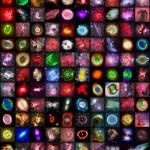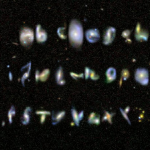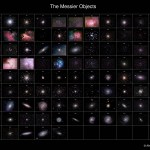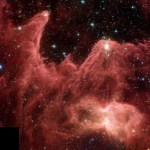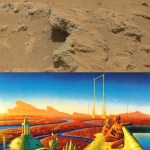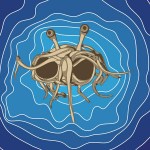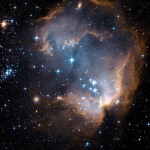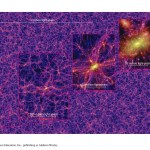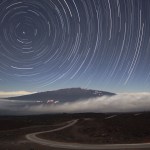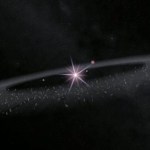Astronomy
“The aim of science is not to open the door to infinite wisdom, but to set a limit to infinite error.” -Bertolt Brecht
One of the most frequent questions I get about the Universe -- as a cosmologist -- isn't quite about the Big Bang in and of itself.
The expansion of the Universe in reverse; image source unknown.
The Big Bang is a remarkable idea, of course, that says that, based on the observations that the Universe is expanding and cooling today, it was hotter, denser, and physically smaller in the past. This gets particularly exciting when we extrapolate very far back in the history…
"A colour is a physical object as soon as we consider its dependence, for instance, upon its luminous source, upon other colours, upon temperatures, upon spaces, and so forth." -Ernst Mach
Our Sun, like all Sun-like stars, will come to the end of its life someday. All the hydrogen fuel in its core will eventually burn up, and when this happens, the core itself will begin to contract. When temperatures are finally high enough, the end product of hydrogen fusion -- Helium-4 -- will begin to fuse in the contracted core, and the Sun will expand into a Red Giant.
Image credit: Northwestern…
Or, how may hours should graduate students work?
Well, depends...
However Many You Like
As Many As They Can
As Many As Are Needed
All Of Them
The answer may sometimes lie in the above range, sometimes may be somewhat less, and occasionally even more.
We've all been there, and all suffer from survivor bias, confirmation bias and not a little survivor's guilt.
The occasion of course, is The Letter very helpfully sent to all the astronomy graduate students at a distinguished research university by a well intentioned distinguished faculty member.
It is causing quite the buzz in astro social…
"It's Dr. Evil, I didn't spend six years in Evil Medical School to be called "mister," thank you very much." -Dr. Evil, from Austin Powers: International Man of Mystery
Graduate school is hard work, and Ph.D. programs in Physics and Astronomy are some of the most demanding and competitive ones out there. It's well-known that it's incredibly difficult to strike a good work/life balance while you're in graduate school, and that between classes, homework, reading, research, and any teaching or service duties you may have, you cannot expect to spend only 40 hours a week on all of your…
"When I was having that alphabet soup, I never thought that it would pay off." -Vanna White
Ever want an A-to-Z illustrated alphabet of astrophysics? Turns out that -- other than writing your own via Galaxy Zoo -- it doesn't yet exist. So I thought it would be delightful to make one for you... right now!
Image credit: Flickr user Image Editor / 11304375@N07.
A is for Aurora, polar lights fast and slow,
the Sun's hot electrons make the atmosphere glow.
Image credit: Andrew Hamilton of JILA / Colorado, http://jila.colorado.edu/~ajsh/insidebh/schw.html.
B is for Black hole, a star'…
"It took less than an hour to make the atoms, a few hundred million years to make the stars and planets, but five billion years to make man!" -George Gamow
Earlier today, a video (from last month) was released where one of the members of the US House of Representative -- a member who sits on the House Committee for Science, Space and Technology -- proudly proclaimed the following:
"All that stuff I was taught about evolution, embryology, the big bang theory; all of that is lies straight from the pit of hell." -Paul Broun
Well, if the Big Bang is a lie from the pit of hell, then the…
In which we win an award from the New Frontiers in Astronomy Program.
The New Frontiers in Astronomy and Cosmology program announced its research grant award winners yesterday.
The last, but not least of the Big Questions solicited in the Call for Proposals, was:
Are we alone in the universe? Or, are there other life and intelligence beyond the solar system?
There were four awards in this "Astrobiology and SETI" category, focusing on different approaches in the search for life elsewhere in the Universe.
We got one:
"Constraining the Abundance of Kardashev Type II and III Civilizations From…
The New Frontiers in Astronomy and Cosmology program included 21 awards for essays by high school and university students on the Big Questions.
The winners are:
Student Essay Competition
College Essay Winners
First Prize
Yong Wei Chong Gabrielle, Wellesley College,
"A Letter to My Dearest Newborn Baby Brother"
Second Prizes
Karl Haislmaier, George Mason University,
"The Emergence of Complexity in the Universe as Viewed from a Holistic Perspective"
Patrick Olden, University of St. Andrews,
"How can we know the complex?"
Third Prizes
Annette Hein, Casper College,
"The Observer's Eye: Human…
The New Frontiers in Astronomy and Cosmology program has
announced its Award winners!
The $4+ million in awards went to 20 scientists studying Big Questions on fundamental issues and 21 high school and university student essay prize winners.
The awards will be presented at a conference at the Franklin Institute in Philadelphia next week.
The program is funded by the Templeton Foundation as part of its celebration of the centennial of the birth of its founder, John Templeton.
The topics solicited for the Big Questions were very interesting:
What was the earliest state of the universe?
What…
“One life is all we have and we live it as we believe in living it. But to sacrifice what you are and to live without belief, that is a fate more terrible than dying.” -Joan of Arc
Regardless of what intrinsic differences any person or group of people have from another, everyone deserves to be treated as an individual, afforded the same opportunities to pursue their passions, goals and dreams, and evaluated on the merits of their performance. Although this is not yet the way the world works, I am confident that many strides are consistently being made in the right direction, and I was…
"Man alone is born crying, lives complaining, and dies disappointed." -Samuel Johnson
But the stars, as opposed to humans, are born shining, with hundreds (or more) of brothers and sisters, shine ever more brightly over their lifetimes, and die in spectacular fashion. As far as we can tell, here's the past, present and future story of all the Sun-like stars in our galaxy.
Bok Globule Barnard 175; image credit by Jerry Lodriguss of http://www.astropix.com/.
At some point in the far distant past, every star in our galaxy was once no more than a molecular cloud of gas, with gravity attempting…
The space-heads among you have undoubtedly heard about the Curiosity rover's first significant discovery: the remnants of an ancient streambed on Mars, which would seem to indicate the presence of water in the planet's history. This jagged pile of alluvial rock and dust may not look like much, but it brings to mind one of my favorite pieces of Martian historical arcana.
For a time in the late 19th century, it was believed that there were canals on Mars.
The Italian astronomer Giovanni Schiaparelli, who observed Mars in 1877, was the first to describe, name, and lovingly illustrate…
"It is by going down into the abyss that we recover the treasures of life. Where you stumble, there lies your treasure." -Joseph Campbell
One of the bravest things that was ever done with the Hubble Space Telescope was to find a patch of sky with absolutely nothing in it -- no bright stars, no nebulae, and no known galaxies -- and observe it. Not just for a few minutes, or an hour, or even for a day. But orbit-after-orbit, for a huge amount of time, staring off into the nothingness of empty space, recording image after image of pure darkness.
What would we find, out beyond the limits of what…
"And now here is my secret, a very simple secret; it is only with the heart that one can see rightly, what is essential is invisible to the eye." -Antoine de Saint-Exupery
The great nebular structures stretching across our galaxy are evidence of the birth and deaths of stars, or so I -- an astrophysicist -- have been telling you. But an apparently void region of our sky was discovered to house a nebula so remarkable, that I never would have imagined it could exist in the heavens.
Image credit: a 10-degree field-of-view on the sky, created with Stellarium.
Just a degree or two away from the…
"The self-same atoms which, chaotically dispersed, made the nebula, now, jammed and temporarily caught in peculiar positions, form our brains; and the 'evolution' of brains, if understood, would be simply the account of how the atoms came to be so caught and jammed." -William James
Up in the heavens, there are planets, stars, and galaxies all clearly visible in the night sky.
Image credit: Dan & Cindy Duriscoe, FDSC, Lowell Obs., USNO.
But those stars weren't always there, and they won't be there forever. The other class of object in the night sky -- the nebulae -- come in two…
"In the long run, we shape our lives, and we shape ourselves. The process never ends until we die. And the choices we make are ultimately our own responsibility." -Eleanor Roosevelt
I've always been a big fan of personal freedom, which includes the freedom to speak your mind, say what you think, ask questions, be wrong, and learn. This is, after all, how we've all improved ourselves over our lives, as none of us were born knowing all that we've managed to acquire over our lifetimes.
And I've never had to have an official comment policy for all the years I've been blogging; the most I've…
"Mortal as I am, I know that I am born for a day. But when I follow at my pleasure the serried multitude of the stars in their circular course, my feet no longer touch the Earth." -Ptolemy
As regular readers here will know, earlier this month I went to Glacier National Park, meeting up with an old friend of mine that I hadn't seen in a few years. What you may not have known is that Rich is not just into photography, but he's recently taken an interest in astrophotography, which I started noticing when he started sending me photos like this.
Image credit: Richard Helmich, from April of 2012…
"Nature is relentless and unchangeable, and it is indifferent as to whether its hidden reasons and actions are understandable to man or not." -Galileo Galilei
All of science is rooted in the idea that natural phenomena can be explained naturally, and that if we want to know how anything in the Universe works, all we need to do is ask the Universe the right questions, and the answers will appear.
So what about the question of the night sky, and why it appears to rotate the way it does?
Image credit: Peter Michaud (Gemini Observatory), AURA, NSF.
There are two straightforward…
Anyone want to buy some telescopes?
Heavily used.
Free to a good home.
The NSF has issued a preliminary response to the NSF Astronomy Portfolio Review.
Game on.
NSF MPS/AST Response to Portfolio Review Report (pdf)
This is a 4 page response from NSF Astronomy Division Director Ulvestad to the Portfolio Review, from August 31st 2012.
Implementation is pending current budget negotiations for next fiscal year budget and plan.
Implementation requires acting by end of 2013.
Small Grants: "...Given the constrained budget scenarios and the explicitly higher-priority recommendation for AAG and…
"I have announced this star as a comet, but since it is not accompanied by any nebulosity and, further, since its movement is so slow and rather uniform, it has occurred to me several times that it might be something better than a comet. But I have been careful not to advance this supposition to the public." -Giuseppe Piazzi, discoverer of Ceres, the first Asteroid
Out beyond Mars, but not quite out as far as Jupiter, a collection of thousands of rocky objects, ranging in size from pebbles all the way up to the size of Texas, lies the asteroid belt.
Image credit: David Minton and Renu…

